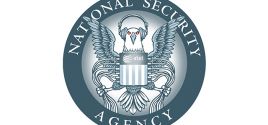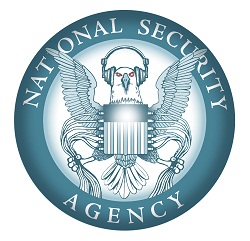Is The NSA In Your Bank Account?by Wendy McElroyThe Dollar Vigilante Dec. 31, 2013 |
Popular 
Patriot ACT on Steroids: FISA Bill Forces 'An Enormous Range' of Businesses to Act as NSA Spies

John Hagee Cheers Israel-Iran Battle as 'Gog and Magog War,' Will Lobby Congress Not to Deescalate

Israel to Extend Water Agreement With Jordan 'For Helping Shoot Down Iranian Drones'

Telegram Founder Changed Mind on Setting Up Shop in San Francisco After Being Robbed Leaving Twitter HQ

MSNBC's Joy Reid Celebrates Prosecution of Trump as Racial Revenge Against Whitey
 Has the National Security Administration (NSA) been changing the amounts held in the financial accounts of people it targets? The question would seem absurd if it were not for a 308-page report on the NSA that was released on December 12 by an Official White House Panel. Recommendation 31, “Institutional Measures for Cyberspace,” on page 37 and repeated on page 221 reads: (1) Governments should not use surveillance to steal industry secrets to advantage their domestic industry;  Upon reading the panels' report, Trevor Timm (a surveillance expert from the Electronic Frontier Foundation) sent a tweet; it was retweeted by Glenn Greenwald, the journalist who originally leaked documents from Edward Snowden. The tweet read, “Does this NSA report recommendation imply that NSA is conducting offensive cyber attacks against financial systems?” Does it imply that the NSA is or has been altering the financial data of targeted individuals or agencies? Upon reading the panels' report, Trevor Timm (a surveillance expert from the Electronic Frontier Foundation) sent a tweet; it was retweeted by Glenn Greenwald, the journalist who originally leaked documents from Edward Snowden. The tweet read, “Does this NSA report recommendation imply that NSA is conducting offensive cyber attacks against financial systems?” Does it imply that the NSA is or has been altering the financial data of targeted individuals or agencies?The NSA certainly has the ability to do so because it has the information to do so. The German news source Der Spiegel (September 15th, 2013) reported on an internal NSA branch known as “Follow the Money” (FTM). The branch monitors “international payments, banking and credit card transactions." In a responsive statement, the NSA admitted to tracking financial information but only as it related to terrorist financing and terror networks. It states, "This information is collected through regulatory, law enforcement, diplomatic, and intelligence channels, as well as through undertakings with cooperating foreign allies and partners." One “cooperating” ally is apparently the international bank messaging system Society for Worldwide Interbank Financial Telecommunication or SWIFT. The system promotes itself as a financial service “with speed, certainty and confidence.” Over 10,000 banking organizations in 212 countries use SWIFT. In a carefully worded statement, SWIFT's chief information officer Mike Fish indicated that the agency had “no evidence to suggest” there had been “any unauthorized access.” The key word is, of course, “unauthorized.” The NSA stores the financial information in a databank called Tracfin. (An identically-named database was created in France in 1990 with the stated goal of tracking illegal financial transactions; it is not clear if the database used by the NSA is somehow connected.) According to Der Spiegel, Tracfin “in 2011 contained 180 million records. Some 84 percent of the data is from credit card transactions.” If the NSA is monitoring transactions in the Middle East and Germany, then how likely is it to be tracking money within US borders? This is especially likely given that leaked documents from Snowden indicate the NSA has been tracking the Visa credit card system. Visa offered a carefully worded response in which it claimed not to know of any “unauthorized” access to its database. As for other large US financial institutions, it would be surprising if they refused to share information with a government responsible for their economic dominance. The only assurance of financial privacy is the NSA's claim that it is not monitoring American transactions. There are at least three reasons why the assurance is not credible. 1) The tracking of financial transactions within America has been documented for years. In 2008, the Wall Street Journal reported on “so-called 'black programs' whose existence is undisclosed.” Many of them “began years before the 9/11 attacks but have since been given greater reach. Among them, current and former intelligence officials say, is a longstanding Treasury Department program to collect individual financial data including wire transfers and credit-card transactions.” If one government agency has the data, then they all do.In his recent “open letter to the people of Brazil,” Snowden asked that government for political asylum. Of the NSA surveillance, he stated, “These programs were never about terrorism: they’re about economic spying, social control, and diplomatic manipulation. They’re about power.” The foregoing is not surprising or even new, except for one detail. No government body has previously implied that the NSA might be now or in the future altering the information stored by financial institutions. No official has previously suggested that the NSA could bankrupt or lock up the finances of targeted individuals. It is a haunting question: Why would the panel explicitly tell the NSA, “Don’t do this!” if the agency weren't doing it already or planning to do so? The panels' recommendations are heartening because they are overwhelmingly critical of the NSA ; the panel went so far as to unanimously call for splitting up the agency and for safeguards such as transparency. This is another surprise because the panel was hand-picked by Obama and included the die-hard loyalist Cass Sunstein and former CIA deputy director Michael J. Morell. Obama quickly indicated his rejection of some of the panels' recommendations. Watching him deal with the rest of them will make for entertaining popcorn moments. Meanwhile, everyone should make sure they have a print copy and a screen shot of their latest financial statements on hand. People should consider holding assets in a less conventional place than large and 'trusted' financial institutions. The advice sounds paranoid. But as paranoid as you get, it is difficult to keep up with the US government. _ Wendy McElroy is a renowned individualist anarchist and individualist feminist (not the kind of feminist you are used to) and now a staple at The Dollar Vigilante.. She was a co-founder of The Voluntaryist in 1982, and is the author/editor of twelve books, the latest of which is "The Art of Being Free." Follow her work athttp://www.wendymcelroy.com |



